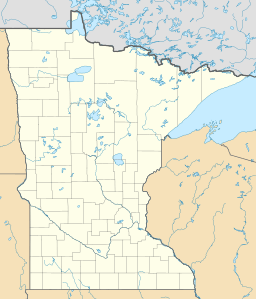Lost Lake (Minnesota) facts for kids
Quick facts for kids Lost Lake |
|
|---|---|
| Location | Minnesota |
| Coordinates | 45°01′50″N 93°24′56″W / 45.0305693°N 93.4155970°W |
| Basin countries | United States |
| Surface area | 45 acres (18 ha) |
| Surface elevation | 929 ft (283 m) |
| Settlements | Mound, Minnesota |
Lost Lake is a small lake located entirely within the city of Mound, Minnesota. It is connected to the much larger Lake Minnetonka. This connection makes Lost Lake an important part of Mound's plans for its downtown area.
Contents
Lost Lake: A Key Part of Mound
Lost Lake is completely inside the city limits of Mound, Minnesota. It acts like a smaller arm of the big Lake Minnetonka. The city of Mound sees Lost Lake as very important for its future plans. They hope that more boaters will visit the downtown area. This could help local businesses grow.
A Look Back: History of Lost Lake
In the past, Lake Minnetonka was a popular place for vacations. Large lake steamers, which were like old passenger boats, used Lost Lake. They traveled through its channel or canal to reach downtown Mound. This brought many tourists right into the heart of the city.
Improving the Lake for Today
To bring back some of that past activity, several improvements have been made. The channel that connects Lost Lake to Lake Minnetonka has been dug deeper. New docks have been built for boats to use. Also, soil nearby that was not clean has been cleaned up. All these efforts aim to make Lost Lake more welcoming for visitors.
Why is it Called Lost Lake?
The name "Lost Lake" likely comes from how the lake used to look. It was almost completely covered by tall plants. These plants included cattails and reeds. Because of all the plants, the lake might have seemed "lost" or hidden.
The Important Role of Lake Plants
Even though the plants made the lake seem hidden, they serve a valuable purpose. These cattails and reeds act like a natural filter. They help to clean the water that flows into Lake Minnetonka. This process is called filtering surface runoff. It helps keep the larger lake healthy and clean.
 | Sharif Bey |
 | Hale Woodruff |
 | Richmond Barthé |
 | Purvis Young |



